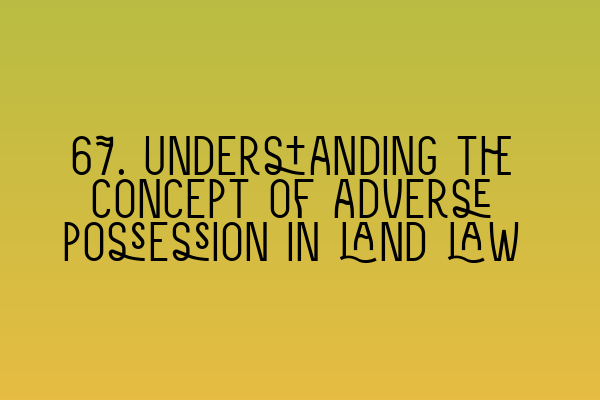67. Understanding the Concept of Adverse Possession in Land Law
Welcome to the SQE Property Law & Land Law blog! In this post, we will explore the fascinating concept of adverse possession in land law. This is a complex area of law that requires careful analysis and understanding. So, let’s dive right in!
What is Adverse Possession?
Adverse possession is a legal principle that allows someone to acquire ownership of another person’s land through continuous and uninterrupted possession for a specified period of time. Essentially, it means that if you possess someone else’s land for a certain period, you may have a legal right to claim ownership.
The Origins of Adverse Possession
The concept of adverse possession dates back to ancient times, when land ownership was often determined by actual possession rather than formal documentation. It evolved as a way to prevent land from remaining unused and abandoned, ensuring that it could be put to productive use.
Requirements for Adverse Possession
To establish adverse possession, certain requirements must be met. Firstly, the possession must be “adverse,” meaning it is without the permission of the true owner. Secondly, it must be “open and notorious,” meaning the possession is visible and apparent to anyone who reasonably inspects the land. Thirdly, the possession must be “exclusive,” meaning the possessor controls the land to the exclusion of others. Lastly, the possession must be “continuous and uninterrupted” for a specified period of time.
The Length of Possession
The length of time required for adverse possession varies depending on jurisdiction. In England and Wales, the necessary period is generally 12 years for registered land under the Land Registration Act 2002, and 10 years for unregistered land. However, there are exceptions and different rules that apply in certain circumstances, such as cases involving fraud or where the true owner is under a disability.
The Effect of Adverse Possession
If the requirements for adverse possession are met, the possessor can apply to the Land Registry to have their name registered as the new owner. This means that the true owner’s rights are extinguished, and the possessor becomes the legal owner. It is important to note that adverse possession does not confer a good title, meaning the new owner’s title is only as good as the previous owner’s.
Challenges to Adverse Possession Claims
Adverse possession claims are not always straightforward, and there are various challenges that can be made. For instance, the true owner can dispute the claim by asserting their own rights and providing evidence of their title. Additionally, if the possession is not continuous or falls short of the necessary requirements, the claim may fail.
Conclusion
Understanding the concept of adverse possession is crucial in navigating the complexities of property law. It is a fascinating area that requires careful consideration of the requirements, length of possession, and potential challenges. If you are dealing with a potential adverse possession claim, it is advised to seek legal advice to ensure your rights and interests are protected.
Thank you for reading our blog post on adverse possession. If you found this information helpful, be sure to check out our related articles:
– SQE 1 Practice Exam Questions
– SQE 1 Practice Mocks FLK1 FLK2
– SQE 2 Preparation Courses
– SQE 1 Preparation Courses
– SRA SQE Exam Dates
For any legal advice or assistance with property law matters, don’t hesitate to contact SQE Property Law & Land Law. We are here to help you navigate the intricacies of property law and ensure you achieve the best possible outcome.
